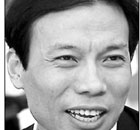Government and Policy
State law amended to protect rights
By Wang Jingqiong (China Daily)
Updated: 2010-04-30 07:29
 |
Large Medium Small |
BEIJING - People's rights will be better protected from State infringement under a revised State Compensation Law adopted on Thursday.
The amendment, passed at a session of the National People's Congress Standing Committee, enshrines compensation for mental trauma and stipulates that compensation should be paid for injuries inflicted when officials at detention centers or prisons abuse or beat inmates, or allow others to do so.
Experts also spoke highly of the new stipulation that detention centers and prisons have the obligation to prove their innocence if an inmate is found dead or incapacitated, or they will be held responsible. Previously, if an inmate died his family had to collect evidence.
The change follows a string of inmate deaths in detention houses in the last year, which has aroused public concern.
Legislators said police need a reasonable period of time to investigate and screen suspects, but experts argue that people's rights should not give away to the convenience of the investigation department.
"If a totally innocent person is held for 37 days in a detention house because the police thought he might be a suspect or because he was framed, I don't think it's fair to pay him nothing for his suffering," said Ma Huaide, a professor at China University of Political Science and Law.
Xinhua contributed to this story











